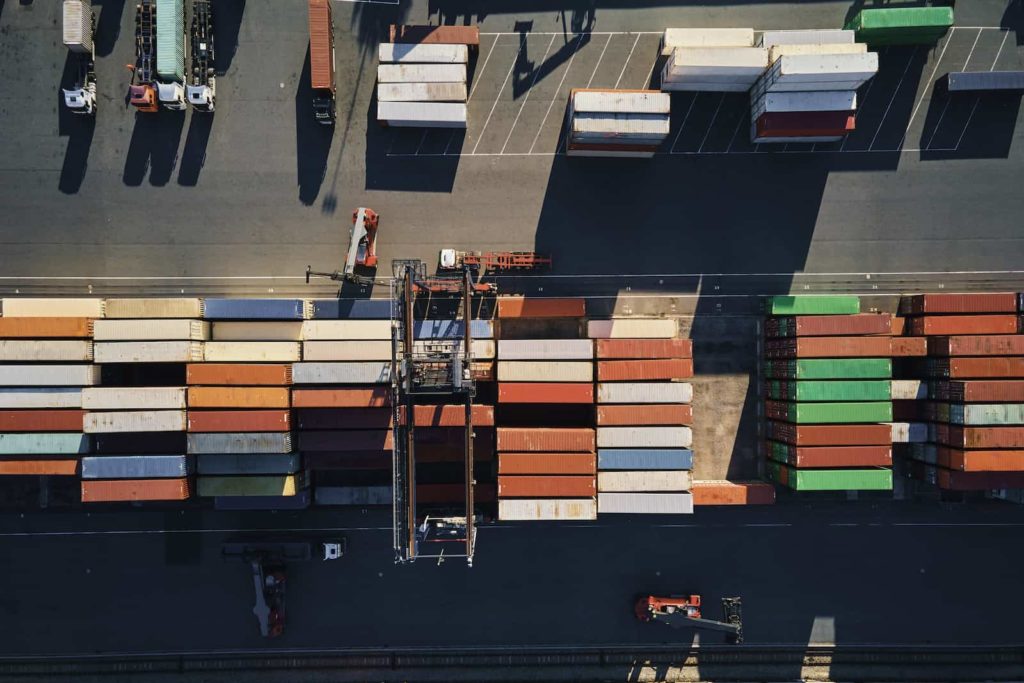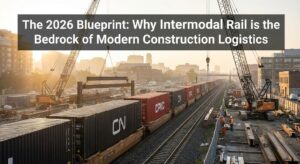Intermodal vs Truckload Shipments: Key Differences You Need to Know
This post was last updated on May 21st, 2025
In 2025, supply chain efficiency has become a cornerstone of business success, and one of the most important decisions shippers face is selecting between intermodal vs truckload shipping. While both methods are widely used across Canada and the United States, understanding the fundamental differences in cost, efficiency, reliability, and security is key to making confident, strategic decisions. Choosing between intermodal vs truckload shipping isn’t just a logistics choice—it directly affects customer satisfaction, operational performance, and your company’s bottom line.
Intermodal shipping involves using multiple modes of transportation – primarily rail and truck – to move goods across long distances. This method relies heavily on standardized shipping containers that can easily transfer between trucks and trains without unloading the cargo. Intermodal shipping is especially beneficial for shipments traveling more than 500 miles, offering a balance between cost-effectiveness and reduced environmental impact.
Truckload shipping, on the other hand, involves transporting freight via a single truck from origin to destination without transfers. This method is favored for time-sensitive deliveries, delicate cargo, and routes where rail infrastructure may not be accessible. Truckload shipping provides the benefit of minimal handling, which reduces the risk of damage or delays associated with modal changes.
One of the most compelling advantages of intermodal vs truckload shipping is cost savings. Rail transport is significantly more fuel-efficient than trucks, making it a preferred option for shippers looking to cut transportation expenses without compromising reliability. In contrast, truckload shipping, while more expensive over long distances, offers greater flexibility and quicker delivery times on short-haul routes.
Environmental impact is another key consideration in the intermodal vs truckload debate. Rail shipping produces fewer greenhouse gas emissions, making intermodal solutions more appealing to eco-conscious brands focused on sustainability. As regulations tighten and customer preferences shift toward greener operations, intermodal shipping presents a long-term competitive edge.
Security and risk reduction also play major roles in the decision-making process. Intermodal shipping tends to be more secure because rail routes are less accessible than highways and typically involve fewer stops. This reduces opportunities for theft and damage. Truckload shipments, while more exposed, allow for greater oversight and route flexibility.
Capacity and scalability are crucial for growing businesses. Intermodal networks across North America have expanded significantly in 2025, offering increased rail access and improved scheduling accuracy. Truckload availability, on the other hand, can fluctuate with driver shortages and rising fuel costs. Intermodal solutions help mitigate these challenges by leveraging rail’s higher capacity and lower volatility.
Of course, not all cargo is suited for intermodal transport. High-value, perishable, or time-sensitive goods may fare better with truckload delivery due to the direct routing and shorter transit time. Understanding your cargo type, delivery window, and budget constraints will help determine whether intermodal or truckload is the smarter option.
In this guide, we’ll walk you through the latest trends, performance comparisons, and best practices to help you make informed shipping decisions. From cost savings and sustainability to security and service reliability, you’ll discover exactly how to choose between intermodal vs truckload shipping in 2025 and why the right choice can drive long-term success.
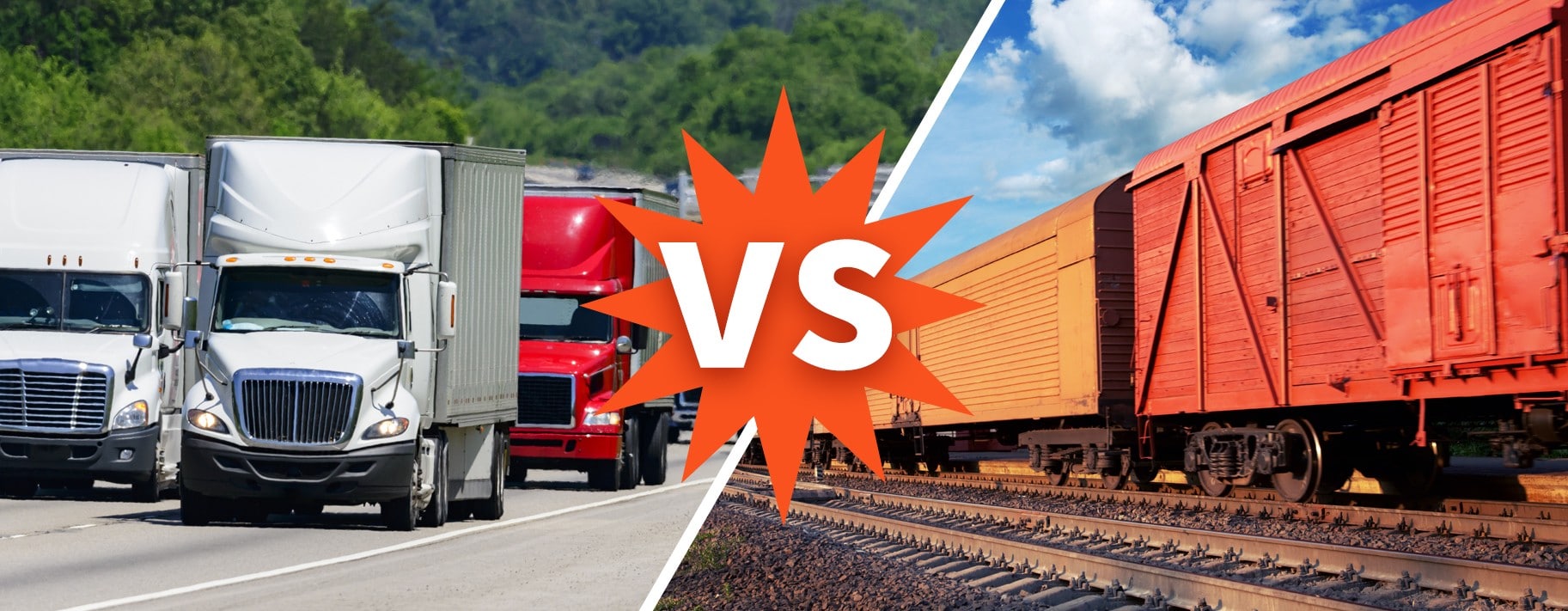
What is Intermodal vs Truckload Shipping?
The most important thing for you to know about intermodal vs truckload shipping carriers is that they are not made equal.
Intermodal freight carriers move goods from one mode of transportation to another without ever unloading the merchandise, thanks to intermodal containerization.
While OTR’s (over-the-road trucking carriers) provide truckload shipments, meaning the merchandise will be moved in a loaded trailer, from origin to destination, or from warehouses to intermodal trains or depots.
What are the key differences between intermodal vs truckload shipping?
You’ve probably heard this before, rail is cheaper than truck transport, but when does over-the-road trucking make more sense in a supply chain strategy?
Truckload shipping is ideal for time-sensitive shipments, high-value freight that will travel a short distance. Because truckload carriers’ schedules are more flexible, they can collect and deliver freight at more convenient times.
Intermodal transportation requires more planning and is ideal for high-volume shipments that aren’t time-sensitive and can travel a long distance without damage.
Because intermodal containers are the same size and can be lifted by a crane, it’s easy to transfer freight from one truck or train to another without unloading and reloading the cargo.
When to Choose Truckload?
- More than 80 km (or 50 miles) from an intermodal ramp but less than 800 km or 500 miles to the final destination.
- Urgent, last-minute, time-sensitive shipments where speed is the most important logistics factor.
- Perishable goods or freight within proper storage containers on short or demanding transit times.
- Inconvenient intermodal ramp locations
When to Choose Intermodal vs Truckload ?
- If you have a predictable intermodal shipment schedule that is frequent and where freight spend is the most important logistics factor.
- For larger intermodal freight shipments with longer transit times or irregular/ unpredictable shipments that do not require urgent delivery.
- Delivery distance is more than 800 km or 500 miles.
- A desire to offset carbon footprint or reduce greenhouse gas emissions.
What are the main criteria to make an informed decision between intermodal vs truckload?
When comparing intermodal vs truckload shipping, companies should take into account 3 key factors:
– Distance: How far will the freight travel? What’s the distance from the origin to the final destination?
– Size and weight: What is the size of the shipment? How large is the item being shipped? What is the total weight?
– Convenience and time lime: What’s the best route? What’s the delivery window? How urgently do the goods need to be delivered?
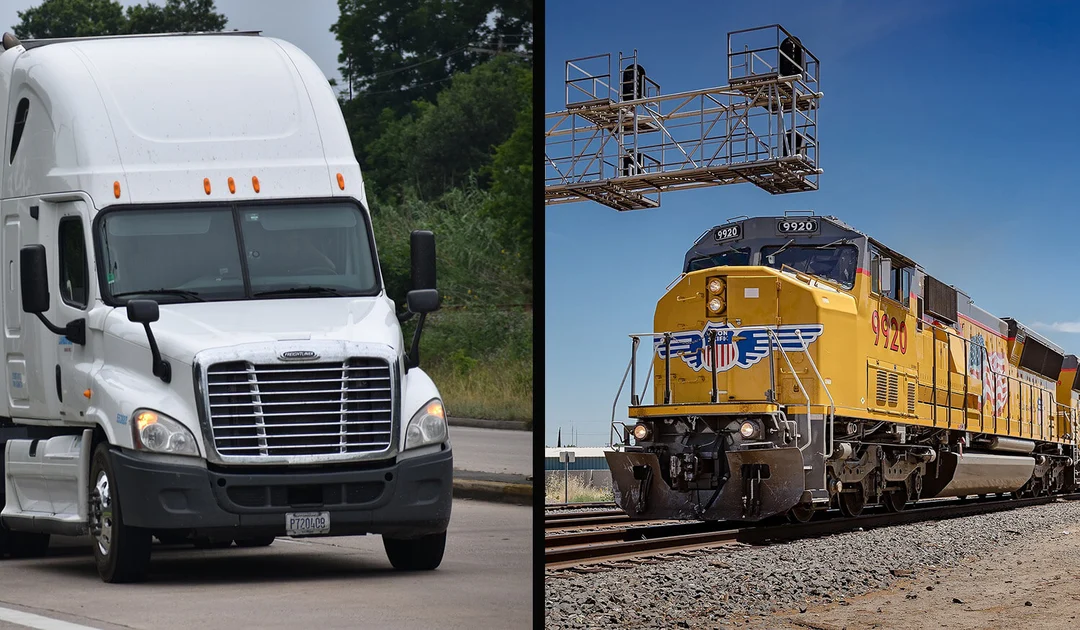
Which option is best for your business intermodal vs truckload?
For moving freight in a non-time-sensitive way and for a long distance, most intermodal providers will offer you lower transportation costs. Intermodal shipments also have better fuel efficiency, a lighter carbon footprint, and a safer shipping service than truckload shipping.
However, choose truckload if prices are non of your concern but you intend to ship on short distances and if you are worried about the deadline of your delivery. Indeed, truckload transit time is usually faster than with intermodal transportation, and it is much easier to find a truck when you need one.
Moving from Truckload to Intermodal Rail
Is intermodal cheaper than truckload?
In many cases, intermodal transportation is cheaper and more fuel-efficient than other logistic modes. But it’s not always the right fit or solution.
Contact one of our logistics experts to discuss your specific needs and see if intermodal is the right choice for you.
What is intermodal shipping?
Intermodal shipping is the movement or transportation of goods using more than one mode of transport (rail, truck, ship, air).
Curious if intermodal is right for your business? Read our post about when and why you should make the switch.
What is the difference between drayage and intermodal?
Both terms refer to the movement of goods. Drayage, the movement of cargo over a short distance. And intermodal, the complete shipment journey over a longer distance.
Please read our guide on intermodal terms and phrases everyone getting started with intermodal should know.
What is meant by truckload?
Truckload freight is cargo that fills a truck or part of a truck. The term usually applies to shipments too large to move by rail.
What does FTL or LTL mean in shipping terms?
FTL stands for full truckload, while LTL, less than a full truckload. This term references the cargo, goods, products, or raw materials.
With a full truckload, the goods of a client fill the entire truck or intermodal container. On the contrary, with less than full truckload shipments, only part of a truck is loaded by a client. This means that in order for the truck to be more cost and fuel-efficient, the service provider has to contract and fill his truck with loads from other businesses too.
Read our guide on picking the right shipping terms for your needs.
The benefits of intermodal offer great reasons to be switching up your game to conquer further away locations. But moving from truckload to intermodal rail can be an expensive and time-consuming process.
Luckily, there are many affordable options for shipping that may work better.
If you’re considering moving your company over to a more environmentally friendly method of transporting goods by opting for the cheaper option of switching over to intermodal transportation, contact one of our logistics experts today!
We’ll help you find the best solution based on your needs and budget.
Conclusion
As we conclude this deep dive into intermodal vs truckload shipping, one message stands out clearly: making the right transportation choice is a strategic business decision, not a one-size-fits-all solution. In 2025, where agility, cost-efficiency, and customer expectations are higher than ever, selecting the appropriate mode of freight delivery can distinguish a high-performing supply chain from one that struggles to keep up.
Intermodal shipping has emerged as a powerful tool for shippers moving freight across long distances – especially in corridors between Canada and the United States. With improved rail infrastructure, real-time tracking technologies, and advanced container handling systems, intermodal solutions today are far more efficient and reliable than in years past. Intermodal shipping allows businesses to lower their carbon footprint, reduce shipping costs, and optimize high-volume logistics strategies.
However, the benefits of truckload shipping cannot be overlooked. When time is of the essence, or when fragile cargo requires limited handling, truckload freight continues to offer unmatched control and faster transit. Direct door-to-door delivery, reduced handling risks, and the ability to service remote locations where rail networks don’t reach give truckload shipping a competitive advantage in certain scenarios.
For many businesses, the best solution may not be choosing between intermodal vs truckload – but knowing when to use each. A hybrid shipping strategy that incorporates both intermodal and truckload freight allows businesses to optimize for speed, cost, and risk simultaneously. For example, time-insensitive freight can be moved via intermodal to lower transportation spend, while critical shipments can be prioritized via full truckload delivery.
Technology is also transforming the way companies manage intermodal vs truckload decisions. Transportation management systems (TMS), predictive analytics, and AI-driven route optimization enable logistics professionals to analyze transit times, costs, and carrier performance in real time. This data-driven approach empowers shippers to make confident, agile decisions that improve operational performance and customer satisfaction.
Moreover, 2025 has seen a rise in shipper education and collaboration across the logistics industry. Third-party logistics providers (3PLs) and freight brokers play a pivotal role in helping businesses navigate intermodal and truckload complexities. These partners provide the expertise and connections necessary to execute shipments seamlessly, regardless of mode.
As your business evolves, so should your shipping strategy. If you’re scaling operations, entering new markets, or responding to economic fluctuations, reevaluating your intermodal vs truckload mix can unlock hidden efficiencies. Take the time to assess your freight characteristics, customer expectations, and long-term growth plans.
To summarize:
- Use intermodal shipping for cost efficiency, long-distance transport, and sustainability initiatives.
- Choose truckload shipping for speed, high-value cargo, and flexible routing.
- Adopt a hybrid approach when your shipping network demands both savings and service excellence.
The goal is not simply to choose one method over the other – but to choose wisely, consistently, and in alignment with your supply chain goals. Whether you’re shipping across Canadian provinces, delivering cross-border into the U.S., or coordinating last-mile logistics, your mastery of intermodal vs truckload shipping will shape your success in 2025 and beyond.
Ultimately, being informed is your most valuable asset. Leverage technology, build relationships with trusted carriers, and remain open to evolving logistics models. In today’s competitive market, those who understand the nuances between intermodal and truckload shipping will deliver smarter, safer, and more scalable solutions.
Now that you’re equipped with the insights, tips, and best practices, it’s time to apply them. Revisit your shipping workflows, talk to your logistics partners, and start testing strategies that combine the strengths of both intermodal and truckload freight. Your cargo – and your bottom line – will thank you.
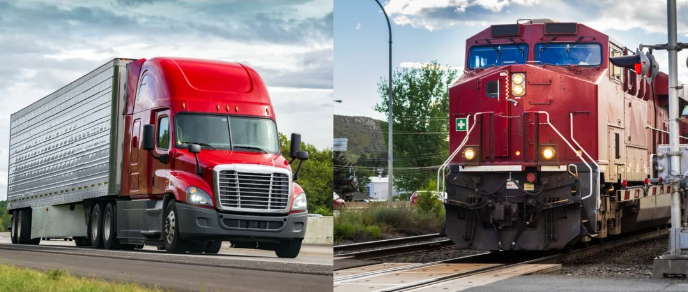
FAQ
1. What is the difference between intermodal and truckload shipping?
Intermodal shipping involves moving freight using two or more modes of transportation – typically rail and truck – without handling the cargo itself when switching modes. Truckload shipping, on the other hand, uses a single truck to transport freight directly from origin to destination. The main difference in intermodal vs truckload is the number of transportation modes involved and how the cargo is handled along the route.
2. When should I choose intermodal over truckload?
Intermodal shipping is ideal for long-distance hauls where cost savings and sustainability are priorities. It works best when your cargo is not time-sensitive and can handle slightly longer transit times. If you’re comparing intermodal vs truckload, go with intermodal when rail infrastructure is accessible and price is more important than speed.
3. Is truckload shipping faster than intermodal?
Yes, truckload shipping is generally faster because it offers direct door-to-door delivery without transfers. Intermodal shipments may take longer due to handoffs between rail and truck and terminal dwell times. If speed is critical, truckload is typically the better option in the intermodal vs truckload equation.
4. Which option is more cost-effective: intermodal or truckload?
Intermodal shipping is often more affordable, especially for long-haul shipments over 500 miles. Rail is more fuel-efficient and offers better rates for large volumes, which lowers overall freight spend. So in many intermodal vs truckload comparisons, intermodal wins on cost – but not always on speed or flexibility.
5. Is intermodal shipping environmentally friendly?
Yes, intermodal is considered the greener option since rail emits significantly less CO₂ per ton-mile compared to trucks. By moving more freight by train, shippers reduce their carbon footprint and contribute to corporate sustainability goals. For eco-conscious companies, this is a key advantage in the intermodal vs truckload discussion.
6. Can small businesses use intermodal shipping?
Absolutely. Many third-party logistics providers (3PLs) offer consolidated intermodal services, so even small shippers can benefit without needing full container loads. It’s a smart way to cut costs while accessing wider transportation networks.
7. What kinds of freight are best suited for intermodal shipping?
Non-perishable, packaged goods that are not urgently needed are perfect for intermodal. This includes items like electronics, clothing, industrial parts, and consumer goods. Freight that is durable and can handle longer transit times usually performs well in an intermodal environment.
8. What types of freight are better suited for truckload shipping?
Time-sensitive shipments, fragile items, or freight requiring minimal handling are better served by truckload. Perishables, medical supplies, and just-in-time inventory benefit from the speed and direct routing of truckload service. In the intermodal vs truckload decision, choose truckload for maximum control and fast delivery.
9. Are there any downsides to intermodal shipping?
Yes, while cost-effective, intermodal can introduce delays due to terminal handoffs, weather, or rail congestion. Shippers must also factor in the potential for increased dwell times at intermodal facilities. It’s important to weigh these risks when comparing intermodal vs truckload services.
10. How can I decide between intermodal vs truckload for my business?
Start by assessing your shipment’s urgency, budget, and fragility. If your cargo can tolerate longer delivery windows and you want to save on freight costs, intermodal is often the way to go. For more direct control and faster service, truckload may be the better fit.
How We Can Help
For businesses looking to optimize their freight shipping with reliable, efficient, and cost-effective solutions, RailGateway.ca is your trusted partner in intermodal logistics. Whether you’re new to freight trains or want to enhance your existing supply chain, our team of intermodal experts is ready to guide you every step of the way.
Contact RailGateway.ca today for a free quote or to speak directly with one of our experienced intermodal specialists. Let us help you unlock smarter, smoother shipping solutions tailored to your unique needs.
Visit RailGateway.ca or call us to get started on transforming your freight shipping strategy in 2025 and beyond.

